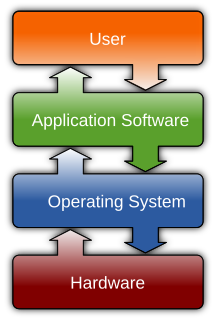
Software is a collection of instructions and data that tell a computer how to work. This is in contrast to physical hardware, from which the system is built and actually performs the work. In computer science and software engineering, computer software is all information processed by computer systems, including programs and data. Computer software includes computer programs, libraries and related non-executable data, such as online documentation or digital media. Computer hardware and software require each other and neither can be realistically used on its own.

In physics, energy is the quantitative property that must be transferred to a body or physical system to perform work on the body, or to heat it. Energy is a conserved quantity; the law of conservation of energy states that energy can be converted in form, but not created or destroyed. The unit of measurement in the International System of Units (SI) of energy is the joule, which is the energy transferred to an object by the work of moving it a distance of one metre against a force of one newton.
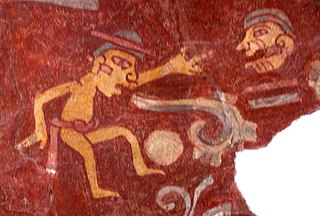
A language is a structured system of communication used by humans, including speech and gesture, sign, and often writing. The most widely-spoken languages have writing systems of glyphs that enable sounds or gestures to be inscribed for later reactivation.
Microsoft Windows, commonly referred to as Windows, is a group of several proprietary graphical operating system families, all of which are developed and marketed by Microsoft. Each family caters to a certain sector of the computing industry. Active Microsoft Windows families include Windows NT and Windows IoT; these may encompass subfamilies,. Defunct Microsoft Windows families include Windows 9x, Windows Mobile and Windows Phone.
macOS is a proprietary graphical operating system developed and marketed by Apple Inc. since 2001. It is the primary operating system for Apple's Mac computers. Within the market of desktop, laptop and home computers, and by web usage, it is the second most widely used desktop OS, after Windows NT.

An operating system (OS) is system software that manages computer hardware, software resources, and provides common services for computer programs.

The International System of Units is the modern form of the metric system. It is the only system of measurement with an official status in nearly every country in the world. It comprises a coherent system of units of measurement starting with seven base units, which are the second, metre, kilogram, ampere, kelvin, mole, and candela. The system allows for an unlimited number of additional units, called derived units, which can always be represented as products of powers of the base units. Twenty-two derived units have been provided with special names and symbols. The seven base units and the 22 derived units with special names and symbols may be used in combination to express other derived units, which are adopted to facilitate measurement of diverse quantities. The SI also provides twenty prefixes to the unit names and unit symbols that may be used when specifying power-of-ten multiples and sub-multiples of SI units. The SI is intended to be an evolving system; units and prefixes are created and unit definitions are modified through international agreement as the technology of measurement progresses and the precision of measurements improves.

Sex is a trait that determines an individual's reproductive function, male or female, in animals and plants that propagate their species through sexual reproduction. The type of gametes produced by an organism defines its sex. Commonly in plants and animals, male organisms produce smaller gametes while female organisms produce larger gametes. Organisms that produce both types of gametes are called hermaphrodites. During sexual reproduction, male and female gametes fuse to form zygotes that develop into offspring that inherit a selection of the traits of each parent.
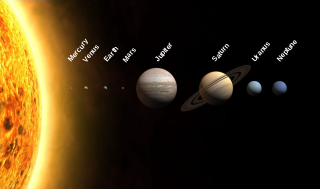
The Solar System is the gravitationally bound system of the Sun and the objects that orbit it, either directly or indirectly. Of the objects that orbit the Sun directly, the largest are the eight planets, with the remainder being smaller objects, the dwarf planets and small Solar System bodies. Of the objects that orbit the Sun indirectly—the natural satellites—two are larger than the smallest planet, Mercury.
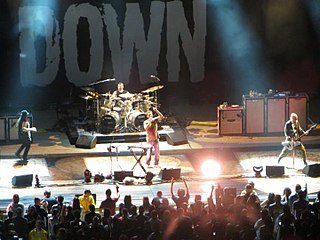
System of a Down is an Armenian-American heavy metal band formed in Glendale, California, in 1994. It currently consists of members Serj Tankian, Daron Malakian, Shavo Odadjian, and John Dolmayan (drums), who replaced original drummer Andy Khachaturian in 1997.

In biology, taxonomy is the scientific study of naming, defining (circumscribing) and classifying groups of biological organisms based on shared characteristics. Organisms are grouped into taxa and these groups are given a taxonomic rank; groups of a given rank can be aggregated to form a more inclusive group of higher rank, thus creating a taxonomic hierarchy. The principal ranks in modern use are domain, kingdom, phylum, class, order, family, genus, and species. The Swedish botanist Carl Linnaeus is regarded as the founder of the current system of taxonomy, as he developed a ranked system known as Linnaean taxonomy for categorizing organisms and binominal nomenclature for naming organisms.

A geographic coordinate system (GCS) is a coordinate system associated with positions on Earth. A GCS can give positions:

The circulatory system, also called the cardiovascular system or the vascular system, is an organ system that permits blood to circulate and transport nutrients, oxygen, carbon dioxide, hormones, and blood cells to and from the cells in the body to provide nourishment and help in fighting diseases, stabilize temperature and pH, and maintain homeostasis.

The Most Excellent Order of the British Empire is a British order of chivalry, rewarding contributions to the arts and sciences, work with charitable and welfare organisations, and public service outside the civil service. It was established on 4 June 1917 by King George V and comprises five classes across both civil and military divisions, the most senior two of which make the recipient either a knight if male or dame if female. There is also the related British Empire Medal, whose recipients are affiliated with, but not members of the order.

A digital object identifier (DOI) is a persistent identifier or handle used to identify objects uniquely, standardized by the International Organization for Standardization (ISO). An implementation of the Handle System, DOIs are in wide use mainly to identify academic, professional, and government information, such as journal articles, research reports, data sets, and official publications. However, they also have been used to identify other types of information resources, such as commercial videos.
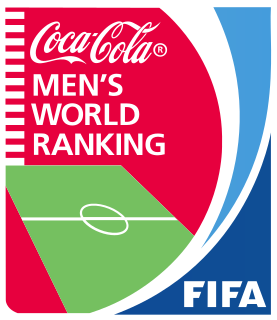
The men's FIFA World Ranking is a ranking system for men's national teams in association football, currently led by Belgium. The teams of the men's member nations of FIFA, football's world governing body, are ranked based on their game results with the most successful teams being ranked highest. The rankings were introduced in December 1992, and eight teams have held the top position, of which Brazil have spent the longest ranked first.

Linux is a family of open-source Unix-like operating systems based on the Linux kernel, an operating system kernel first released on September 17, 1991, by Linus Torvalds. Linux is typically packaged in a Linux distribution.

A computer is a machine that can be programmed to carry out sequences of arithmetic or logical operations automatically. Modern computers can perform generic sets of operations known as programs. These programs enable computers to perform a wide range of tasks. A computer system is a "complete" computer that includes the hardware, operating system, and peripheral equipment needed and used for "full" operation. This term may also refer to a group of computers that are linked and function together, such as a computer network or computer cluster.

Unix is a family of multitasking, multiuser computer operating systems that derive from the original AT&T Unix, whose development started in the 1970s at the Bell Labs research center by Ken Thompson, Dennis Ritchie, and others.

A cryptocurrency, crypto-currency, or crypto is a digital asset designed to work as a medium of exchange wherein individual coin ownership records are stored in a ledger existing in a form of a computerized database using strong cryptography to secure transaction records, to control the creation of additional coins, and to verify the transfer of coin ownership. It typically does not exist in physical form and is typically not issued by a central authority. Cryptocurrencies typically use decentralized control as opposed to centralized digital currency and central banking systems. When a cryptocurrency is minted or created prior to issuance or issued by a single issuer, it is generally considered centralized. When implemented with decentralized control, each cryptocurrency works through distributed ledger technology, typically a blockchain, that serves as a public financial transaction database.


















